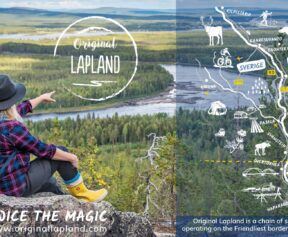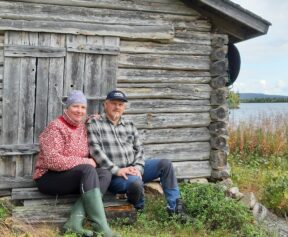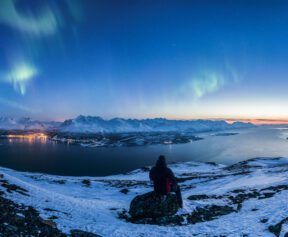See the text in the original language
Arvo Norman and Juhani Pelttari from Vojakkala have been arranging Salmon fishing competition from the beginning.
Arvo and Juhani shared their memories and were wondering if new generation will keep the tradition alive. Tornio river tourism potential was seen very positive.
The story is in Finnish.
Transalation: Salmon Fishing
– I’m Juhani Pelttari, and I’m from the village of Vojakkala. I’ve been involved in running the salmon fishing competition for 24 years.
– I’m Arvo Norman, and I’m the honorary chairman of Vojakkalan Erä (registered association). I’ve been involved with the association for 40 years. Now we’re celebrating our 40thanniversary, so I’ve had lots of additional small tasks.
– Vojakkala salmon fishing competition was launched in 1993. It was an extempore idea, based on all the salmon fishing going on in the village since 50, 100, even 200 years. And since such competitions were being organised elsewhere, we thought that we should do one too. So, I brought it up with Aulis Seppälä, and in a month we were already running our first competition.
– We were hoping to organise an event which would bring people together – both old and new residents of the village. We succeeded: at the first event, there were 93 boats in the competition and around 500 people attending the dance.
– Yes, there were lots and lots of people. In the best of times, there were about 130-140 people rowing the boats.
– Occasionally there have been more rowers, now we’ve had approximately 50 boats or rowers over the past five years.
– Whenever the fish wouldn’t catch – at some point we didn’t catch many – the rowers would stop coming as well, that much was certain. But whenever fish were more plentiful, so were the fishermen.
– We ran the dance event for around 10 years, but the number of participants kept diminishing and it wasn’t worth the effort any more. Then we just focused on the salmon fishing competition.
– At some point, Sweden played a big role in the competition. The Swedes would come to attend the competition from the Swedish side of Vojakkala across the river. So, we’ve had six associations or clubs organising this competition, among which are Vojakkalan Erä and Vojakkala village. In Sweden, they have similar organisers.
– We also had tug-of-war contests across the river. We had a thick and long rope and teams for Sweden and Finland. Once, the river was flooding on such a scale that the flood ended up as the winner. It carried the rope away, and since the other end was anchored in Sweden, we had to bring it back from there.
– Nowadays, I suppose one should always think about becoming more international. This is a fantastic event in the sense that we’re collaborating across the border in the best way possible. Which is as it should be.
– People heard about the competition through the grape vine. Also, lots of caught fish boosts our reputation the most. However, back in the day there were people coming from regions south of Oulu, from Nivala and other places. People also arrived from the northern village of Pello. One year, a group of guys from Pello were fishing in the boat. Somebody called them, informing them that somebody had caught a salmon weighing 10 kilos in Pello. The boys picked up their things and went back to Pello to fish. They just left, feeling the lure of the fish…
– Vojakkala is a spread-out village stretching out in a long line, approximately six and a half kilometres in length. However, our fishing area comprises only about four kilometres. The area borders with the area above Vaarankoski in the north as well as with the village of Kukkola. This way it’s easier to control the fishing area, and we are aiming to establish a riverside event at Tohmaranta, including other events besides the fishing competition.
– We used to fish throughout the night. We would start on Saturday and finish on Sunday morning.
– Let’s put it this way – people exercise less, so they are unable to row for 24 hours. Doing that doesn’t make much sense to me, either. It’s pretty stressful to the organisers and others as well.
– We were here all night. Just some supervisors would show up – two or three men were always there. Somebody might arrive with a bike and see whether we’d caught any fish, then leave.
– A few years ago, we were organising the event in early June when it was more difficult to catch fish. So, we moved the event to August, thinking that the fish would be easier to catch in early August or late July, when the salmon start to migrate to their spawning grounds. Also, there are so many events taking place in the summer that it’s better to try something else. So, we’ve tried to settle with August the 10th. In the first category, the fish is supposed to be at least 50 cm in length; in the grayling category, 35 cm. So, you have to catch quite large fish to be able to attend the competition. Fish smaller than these are not accepted in the competition.
– According to the rules, if somebody goes first, he should catch the fish by midnight. If there are two people, they should catch two fish. Our first prize is 3 000 euros, isn’t it? That’s in cash. Quite a nice sum, indeed. One year, a group of young men came to the shore. I was here, supervising, and said – why don’t you guys go fishing? So, after a while they came back with a fish which won the competition.
– The biggest fish are always memorable experiences. One weighing 21-22 kilos has stuck in my mind. Earlier, somebody had brought in a fish weighing 10 kilos, which I thought was big. But once I saw the one weighing 22 kilos next to it, I was in awe – that was quite a fish!
– This village should, in my opinion, really invest in fishing tourism and river tourism. There are a lot of opportunities, but it requires some thinking, of course. Gradually, we should bring back the original concept and organise a more varied riverside event. Now we actually have an office and other operations here at Tohmaranta. We are trying to concentrate on this riverside event and make it a big one. That’s what I think. The river is, in any case, an element that many do not have, but we are not really taking advantage of it – at least not here in the Tornio area. There are about a million cars driving by throughout the year, but how many of them stop over in Tornio? That’s quite a small percentage. You don’t need to be begging for money all over the place – the important thing is to provide support. The money comes later. I often think that people don’t really appreciate voluntary work and that a price is put on everything. What we could provide is a memorable experience – that is a valuable thing.
Our Stories haastatteli Arvo Normania ja Juhani Pelttaria Vojakkalan lohensoudussa.
Tarina on kerrottu suomeksi.
Country of origin: Finland





